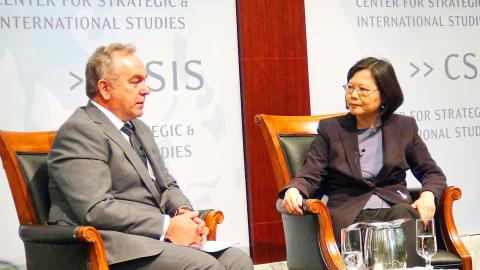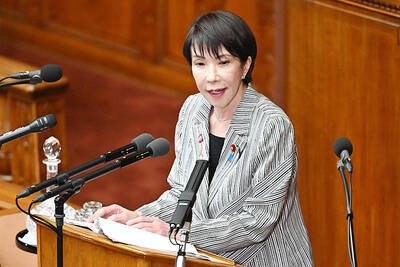Democratic Progressive Party (DPP) Chairperson Tsai Ing-wen (蔡英文) on Wednesday said that she is committed to a “consistent, predictable and sustainable” relationship with China.
In a major speech that was certain to be closely studied by the White House, she said that cross-strait relations must be considered in a long-term context.
“Freedom and democracy are values deeply ingrained in the hearts of the Taiwanese people,” the DPP’s presidential candidate for January’s election said.

Photo: CNA
“The conduct of cross-strait policy must transcend the position of a political party and incorporate different views,” she said. “A leader must take into account public consensus when making decisions. We do have a broad consensus in Taiwan — maintenance of the status quo.”
Later, members of the packed audience at the Center for Strategic and International Studies (CSIS) tried time and again to prod Tsai into expanding on her views of the so-called “1992 consensus.”
However, she consistently refused to do so, referring them back to her just-completed 20-minute address.
At one point, Tsai did answer: “China, the US and Taiwan have different interpretations, may have differences, but we should all agree that maintaining the status quo relationship across the Taiwan Strait serves the interests of everybody.”
It was the main speech to be delivered during her 12-day tour to the US and it came in the midst of meetings with top Washington officials, politicians and think tank experts.
Tsai was introduced by senior adviser for Asia at CSIS Bonnie Glaser and later answered questions from former US assistant secretary of state for East Asian and Pacific affairs Kurt Campbell.
Tsai said she had articulated and reiterated her position of maintaining the “status quo” and that if elected, she would push for the peaceful and stable development of cross-strait relations in accordance with “the will of the Taiwanese people and the existing Republic of China constitutional order.”
Tsai said that the two sides of the Taiwan Strait should treasure and secure the accumulated outcomes of more than 20 years of negotiations and exchanges.
“These accumulated outcomes will serve as the firm basis of my efforts to further the peaceful and stable development of cross-strait relations,” she said.
A Washington analyst later said that the speech would probably satisfy US officials, who were primarily concerned with the DPP’s ability to maintain peace across the Taiwan Strait and not overly upset Beijing.
Tsai said that she would push for a cross-strait agreement oversight bill to establish a comprehensive set of rules overseeing cross-strait exchanges and negotiations.
“The cross-strait agreements which are currently under negotiation or legislative review will be re-examined and further negotiated according to the new rules,” she said.
Tsai pledged to strengthen Taiwan’s democratic institutions and uphold the right of Taiwanese to decide their future free of coercion.
“While I advocate for constructive exchanges and dialogues with China, I will ensure the process is democratic and transparent, and that the economic benefits are equitably shared,” she said.
The speech was attended by most of the leading Washington figures directly involved in Taiwan-US affairs, including American Institute in Taiwan Chairman Raymond Burghardt and US Representative of the Taipei Economic and Cultural Representative Office Shen Lyu-shun (沈呂巡).
“As Asia faces rising nationalism and the threat of military conflict, we intend to engage in proactive peace diplomacy that fosters peace and stability, with the spirit of giving and sharing,” Tsai said.
She said that the DPP was ready to undertake a new model of economic development based on innovation, “as well as to implement a community-based social safety net to compliment the traditional family-based care systems.”
Tsai said that the party was crafting a new Asian value in Taiwan to serve as an example and inspiration to others, and that it was ready to “light up Taiwan, light up Asia.”
She said she was ready to deal with rising domestic and external challenges ranging from the gradual erosion of freedom and democracy to an increasing uncertainty over Taiwan’s ability to maintain its economic autonomy.
“For most Taiwanese, the state of our economy is a source of great distress as it has stagnated for some time and has lost momentum for growth,” Tsai said.
She said the economic slowdown had hit the younger generation in particular and that finding a new economic way forward would be the foremost priority of the DPP.
The primary objective would be to reshape Taiwan’s economic competitiveness by shifting from an efficiency-driven model to an innovation-driven one.
Tsai said that she would build a strategic partnership with the US on economic cooperation and that there was an urgent need for Taiwan to participate in the proposed Trans-Pacific Partnership.
“For Taiwan’s economy to be more competitive and our democracy stronger, we need to build a military capable of safeguarding the country and maintaining peace,” she said.
To be a reliable partner on regional security, she said that proper investment in “credible deterrence” was key.
Tsai said that she would secure the resources necessary to provide adequate training and education for the active and reserve forces.
“In addition to foreign acquisition of defense systems and platforms, I am committed to more investment in indigenous defense programs, including research and development to meet our long-term defense needs,” she said.
Tsai said that Taiwan had a special political, security, economic and cultural bond with the US, but that Taiwan should not take the relationship for granted.
“I will ensure that Taiwan works together with the US to advance our common interests and by having a proactive diplomatic agenda for peace,” she said.
In related news, Minister of Foreign Affairs David Lin (林永樂) yesterday said that Taiwan’s president is elected by its people and that a recent remark by Chinese Ambassador to the US Cui Tiankai (崔天凱) implying that Tsai must meet the approval of the Chinese people was inappropriate.
Cui on Tuesday reportedly said that Tsai should pass the test of the 1.3 billion people in China by accepting the “one China” principle.
Asked to comment on the issue, Lin said Cui’s remarks were “quite inappropriate.”
Additional reporting by CNA

The Central Weather Administration (CWA) yesterday said it expected to issue a sea warning for Typhoon Fung-Wong tomorrow, which it said would possibly make landfall near central Taiwan. As of 2am yesterday, Fung-Wong was about 1,760km southeast of Oluanpi (鵝鑾鼻), Taiwan’s southernmost point, moving west-northwest at 26kph. It is forecast to reach Luzon in the northern Philippines by tomorrow, the CWA said. After entering the South China Sea, Typhoon Fung-Wong is likely to turn northward toward Taiwan, CWA forecaster Chang Chun-yao (張峻堯) said, adding that it would likely make landfall near central Taiwan. The CWA expects to issue a land

Taiwan’s exports soared to an all-time high of US$61.8 billion last month, surging 49.7 percent from a year earlier, as the global frenzy for artificial intelligence (AI) applications and new consumer electronics powered shipments of high-tech goods, the Ministry of Finance said yesterday. It was the first time exports had exceeded the US$60 billion mark, fueled by the global boom in AI development that has significantly boosted Taiwanese companies across the international supply chain, Department of Statistics Director-General Beatrice Tsai (蔡美娜) told a media briefing. “There is a consensus among major AI players that the upcycle is still in its early stage,”

‘SECRETS’: While saying China would not attack during his presidency, Donald Trump declined to say how Washington would respond if Beijing were to take military action US President Donald Trump said that China would not take military action against Taiwan while he is president, as the Chinese leaders “know the consequences.” Trump made the statement during an interview on CBS’ 60 Minutes program that aired on Sunday, a few days after his meeting with Chinese President Xi Jinping (習近平) in South Korea. “He [Xi] has openly said, and his people have openly said at meetings, ‘we would never do anything while President Trump is president,’ because they know the consequences,” Trump said in the interview. However, he repeatedly declined to say exactly how Washington would respond in

Japanese Prime Minister Sanae Takaichi said yesterday that China using armed force against Taiwan could constitute a "survival-threatening situation" for Japan, allowing the country to mobilize the Japanese armed forces under its security laws. Takaichi made the remarks during a parliamentary session yesterday while responding to a question about whether a "Taiwan contingency" involving a Chinese naval blockade would qualify as a "survival-threatening situation" for Japan, according to a report by Japan’s Asahi Shimbun. "If warships are used and other armed actions are involved, I believe this could constitute a survival- threatening